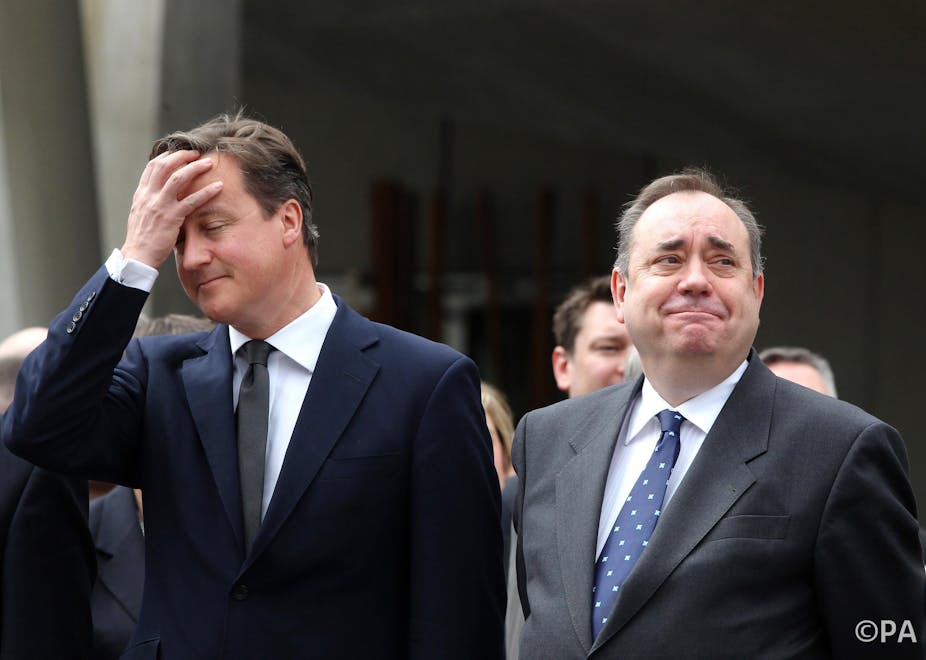With just 10 days until a vote in Scotland on independence from the UK, London dramatically exploded into action. This week we can expect to see a package of measures being offered by the chancellor, George Osborne, including greater powers for the Scottish parliament over spending and tax.
But why did it take the Westminster establishment so long to sit up and notice? The truth is, it has been aware of what has been going on in Scotland for some time, but felt the need to become more vocal now, because the campaign against independence suddenly appears less likely to secure a win in the September 18 referendum.
The narrative had been that an expected, respectable win for No would be followed by promising of further powers. But that has been disrupted by the failure of the No side to present a convincing message to undecided voters.
In a second television debate with Alistair Darling, leader of the Better Together (No to independence) campaign, Scotland’s first minister, Alex Salmond, went into full attack mode for Yes. The Yes campaign has been pushing hard ever since, with street canvassing and social media engagement. So hard, in fact, that the latest poll has it in front. That prompted panic in the coalition and a wobble in the pound.
So the possibility of Yes winning is now clear for all to see, and that represents a sea-change moment.
Polls are a snapshot indicator of opinion, and shouldn’t be taken as a prediction. But the symbolism of this one has sent a much-needed jolt of fear up the spine of the No campaign. Those supporting the continuation of the UK have enjoyed very favourable polls over recent months, thereby encouraging Westminster to relax more about the outcome. This mistake has led to it being seemingly caught off guard when Yes caught up and performed a rhetorical wedgie.
The promise of more powers from London essentially only reaffirms prior commitments, and accusations of panic from the Yes side were thrown back. Although the No campaign denied it, the flurry of activity does indeed give credence to the appearance of panic.
The markets have also started to consider the possibility of a Yes victory. Their response has not been positive, with the pound suffering against the dollar. Rumblings at the Royal Bank of Scotland and Lloyds banking groups have led Unionists to suggest this could be a small flavour of things to come.
The central issue over the unionist campaign has been its negative rhetoric. But a realistic, logical assessment of a given situation is sometimes preferable to the more positive, comforting visions offered by dreamers. The No campaign is striving to highlight the dangers because they are very real. The Yes side argues that all will be well but they have not fully addressed issues such as what will happen with the EU, NATO, currency, social welfare, banking sector or the NHS.
In Westminster, David Cameron is desperate not to be the prime minister who presides over the break-up of the United Kingdom, but his decision not to include deeper devolved government for the Scots on the ballot means he is exposed to blame if they vote Yes.
Such blame could cost him the Conservative leadership, prompting a crisis in the run-up to a general election. This is, of course, small fry compared to the other possible fall-outs that Westminster would want to avoid.
Losing Scotland would throw open debates about national identity in the rest of the UK. Cornwall and Yorkshire are likely to become more belligerent in showcasing their difference for a start. But Northern Ireland would become the most likely territory facing uncertainty in the immediate future. Should Scotland vote Yes then the consequences are likely to unfold over the coming years. To some then, a Yes outcome will be the gift that keeps on giving. However, a No result does not mean the status quo prevails. Rather the closeness of the result will necessitate a rebalancing of power throughout the United Kingdom.
So, why has Westminster suddenly become more vocal? Because for the first time a the possibility of an independent Scotland has been afforded the credibility of a poll lead. It has been enough to put the fear of God into Westminster.

